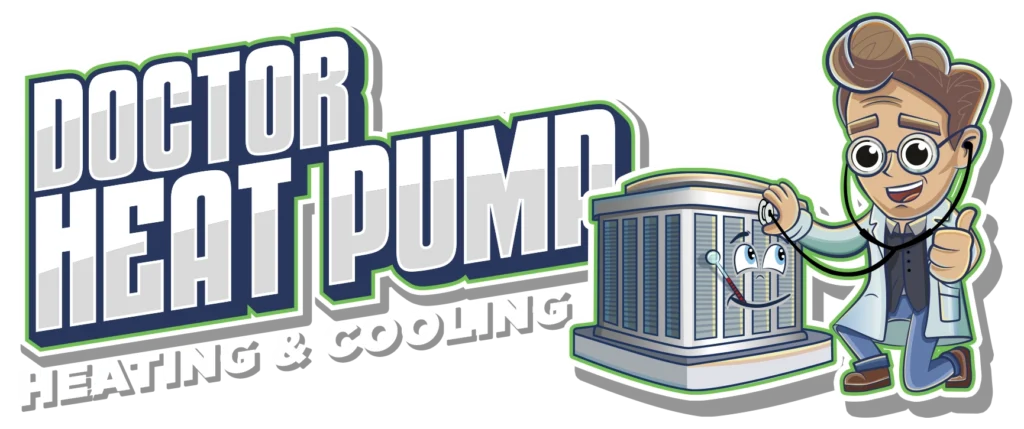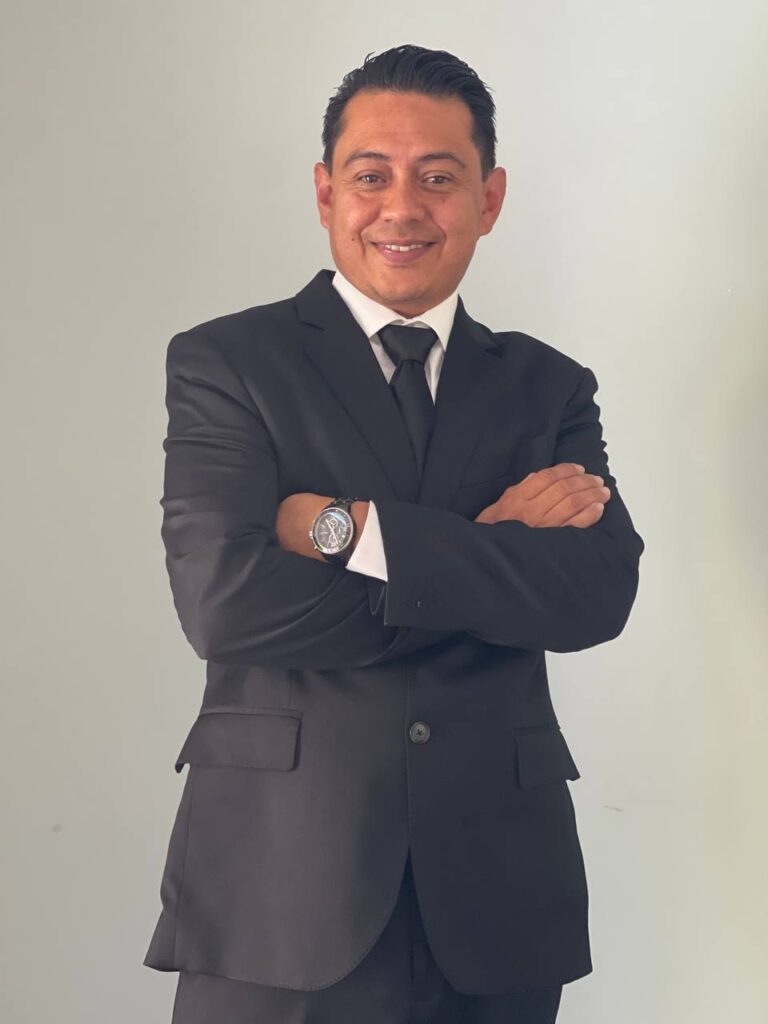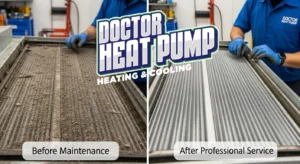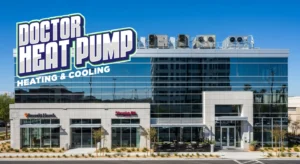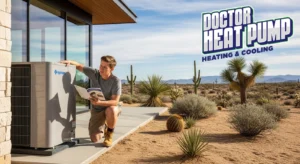At Doctor Heat Pump, we help Las Vegas families get the most from their heat pump systems. If you own a heat pump, you already have a smart system. However, these energy saving tips will help you save even more money. Heat pumps work differently than regular air conditioners. Therefore, knowing how to use yours properly can cut your bills even more. Additionally, these simple changes can make your home more comfortable all year long.
Understanding Your Heat Pump’s Efficiency Basics
How Heat Pumps Work Differently
First, heat pumps don’t make heat like furnaces do. Instead, they move heat from one place to another. This process uses much less energy than creating heat. As a result, your heat pump can be up to three times more efficient than electric heaters.
Why Outdoor Temperature Matters
Your heat pump works best when it’s not too hot or cold outside. In Las Vegas, this means your system runs most efficiently during spring and fall. However, during summer’s extreme heat, your heat pump has to work harder. Similarly, on those rare cold winter nights, efficiency drops slightly.
The Connection Between Maintenance and Energy Use
Most importantly, a clean heat pump uses less energy. When filters are dirty or coils are blocked, your system works harder. Consequently, this leads to higher electric bills. In fact, a neglected heat pump can use 10-25% more energy than a well-maintained one.
Energy Saving Tips for Thermostat and Temperature Management
Smart Temperature Settings
| Season | Recommended Setting | Why This Helps |
|---|---|---|
| Summer | 78°F when home | Reduces strain on system |
| Winter | 68°F when home | Prevents backup heat from turning on |
| Away | 7-10 degrees different | Saves energy without damage |
Additionally, avoid big temperature changes all at once. For example, if your home is 80°F, don’t set the thermostat to 70°F expecting faster cooling. Instead, this makes your system work harder and use more energy.
Why Smart Thermostats Help Heat Pumps
First of all, smart thermostats understand how heat pumps work. Therefore, they won’t trigger expensive backup heat unnecessarily. Also, they can learn your schedule and adjust temperatures automatically. As a result, you save energy without thinking about it.
Avoiding Common Thermostat Mistakes
- Never use “emergency heat” unless it’s truly an emergency
- Don’t constantly adjust the temperature up and down
- Use “auto” fan setting instead of “on”
- Set reasonable temperatures that don’t strain your system
Energy Saving Tips for Seasonal Maintenance
Monthly Tasks You Can Do
Regular maintenance is one of the best energy saving tips for any heat pump owner. First, check your filter every month. In Las Vegas, our dusty air clogs filters quickly. Therefore, dirty filters make your system work harder and use more energy.
Keeping Your Outdoor Unit Clean
Your outdoor unit needs attention too. Here’s what to do:
- Remove leaves, dirt, and debris from around the unit
- Keep plants at least 2 feet away from all sides
- Gently rinse the coils with a garden hose monthly
- Clear snow or ice during rare winter weather
When to Schedule Professional Service
Professional maintenance should happen twice a year. Specifically, schedule service in spring before cooling season and fall before heating season. Additionally, call for service if you notice:
- Higher than normal electric bills
- Uneven temperatures in your home
- Strange noises or smells
- Ice buildup (except during normal defrost cycles)
For more details about maintenance schedules, check out our post on How Often Does an Air Heat Pump Need Maintenance.
Maximizing Heat Pump Performance: More Energy Saving Tips
Understanding Your System’s Special Features
First, let your heat pump handle defrost cycles on its own. During these cycles, you might see steam or hear different sounds. However, this is normal and necessary. Therefore, don’t try to remove ice yourself or adjust settings.
Proper Use of Backup Heat
| Backup Heat Type | When to Use | Energy Cost |
|---|---|---|
| Heat strips | Only during emergencies | Very high |
| Gas furnace | When outdoor temp below 40°F | Moderate |
| Never | For faster heating | Most efficient |
Additionally, backup heat costs much more to run than your heat pump. Consequently, avoid using it unless absolutely necessary.
Optimizing Airflow Throughout Your Home
Good airflow helps your heat pump work efficiently. Therefore:
- Keep all vents open and unblocked
- Don’t close doors to unused rooms
- Use ceiling fans to help circulate air
- Make sure furniture isn’t blocking air returns
For more information about heat pump efficiency, read our article on Are Heat Pumps Expensive to Run? Myths vs. Facts.
Home Efficiency Improvements That Help Your Heat Pump
Insulation and Weatherproofing
A well-sealed home helps your heat pump work less. In Las Vegas high-rises and homes, focus on:
- Sealing air leaks around windows and doors
- Adding weather stripping where needed
- Checking insulation in attics and crawl spaces
- Using window treatments to block sun in summer
Smart Use of Window Coverings
Additionally, window treatments can significantly reduce your heat pump’s workload:
- Close blinds during hot summer days
- Open them during cool winter days to let sun in
- Consider reflective films for west-facing windows
- Use insulated curtains for better temperature control
Ceiling Fan Strategy
Moreover, ceiling fans can help your heat pump be more efficient:
| Season | Fan Direction | Benefit |
|---|---|---|
| Summer | Counterclockwise | Creates cooling breeze |
| Winter | Clockwise | Pushes warm air down |
Energy Saving Tips: Common Mistakes to Avoid
Temperature Setting Errors
Many heat pump owners make mistakes that waste energy. For instance, setting the thermostat too low in summer or too high in winter forces your system to work harder. Instead, use the recommended settings shown earlier.
Blocking Airflow
Similarly, blocking vents or air returns reduces efficiency. Therefore, never:
- Close vents in unused rooms
- Place furniture over air returns
- Install heavy curtains over vents
- Stack items against indoor or outdoor units
Ignoring Warning Signs
Furthermore, ignoring problems leads to bigger issues and higher bills. Consequently, call for help if you notice:
- Unusual increases in your electric bill
- Rooms that won’t reach the right temperature
- Constant cycling on and off
- Frost or ice (except during defrost)
When to Call a Professional
Signs Your Heat Pump Needs Expert Attention
While these energy saving tips help, sometimes professional help is needed. Therefore, contact Doctor Heat Pump if you experience:
- Energy bills that keep rising
- Poor heating or cooling performance
- Strange noises or smells
- Frequent system cycling
Benefits of Professional Maintenance
Moreover, professional service provides benefits you can’t get from DIY maintenance:
- Complete system inspection and cleaning
- Refrigerant level checks and adjustments
- Electrical connection tightening
- Performance testing and optimization
For heating issues, read more in our guide on Heating Repair in Las Vegas.
Choosing the Right Service Provider
Additionally, choosing experienced professionals ensures the best results. Specifically, look for:
- Licensed and insured technicians
- Experience with heat pump systems
- Good reviews from Las Vegas customers
- Clear pricing and service guarantees
Learn more about our heat pump services on our Heat Pump Installation page.
Conclusion
These energy saving tips can help any heat pump owner in Las Vegas save money and stay comfortable. Most importantly, start with the simple changes like adjusting your thermostat and changing filters regularly. Then, gradually implement other suggestions like improving your home’s insulation and scheduling regular maintenance.
Remember, small changes add up to big savings over time. Therefore, even implementing just a few of these energy saving tips will make a difference on your next electric bill. Additionally, a well-maintained heat pump will last longer and keep your family comfortable for years to come.
If you need help implementing any of these suggestions or want a professional evaluation of your heat pump system, contact Doctor Heat Pump at (702) 467-7236. Furthermore, we offer free consultations to help Las Vegas families get the most from their heat pump systems.


